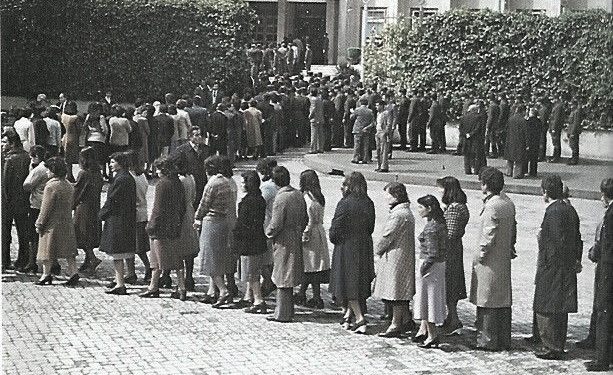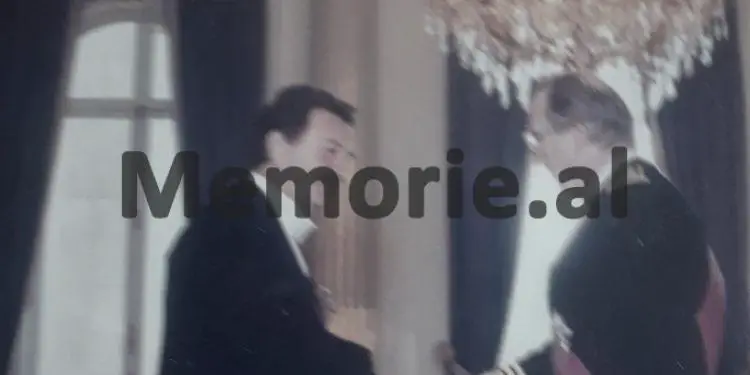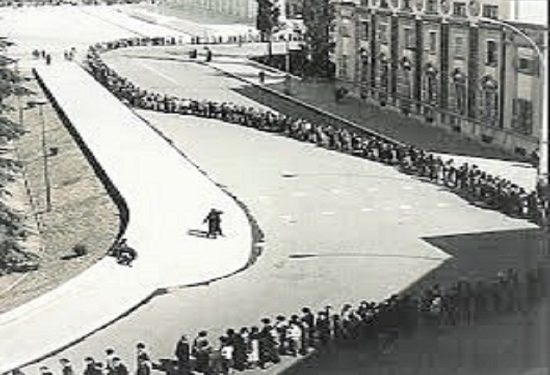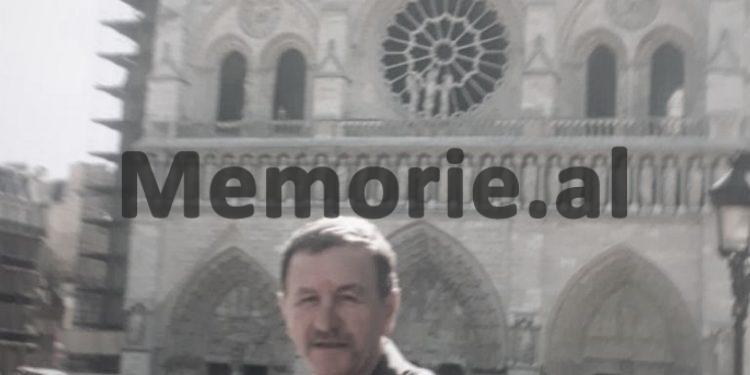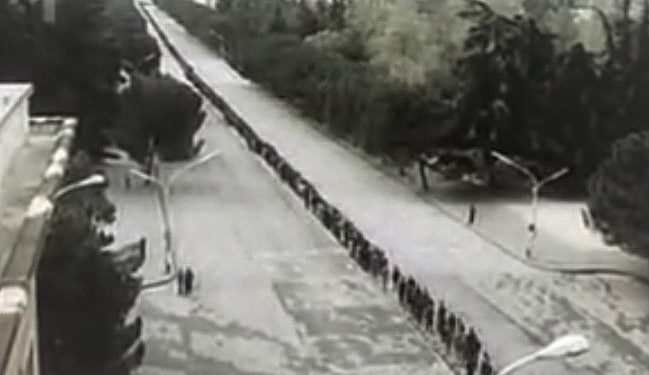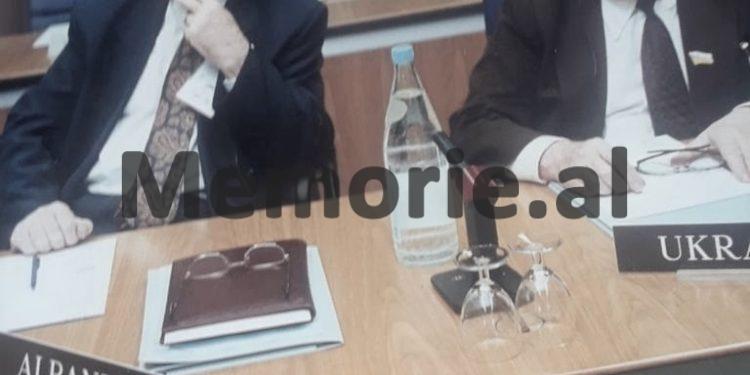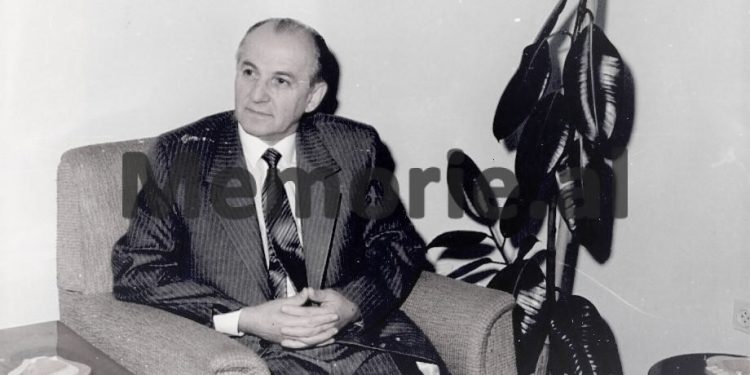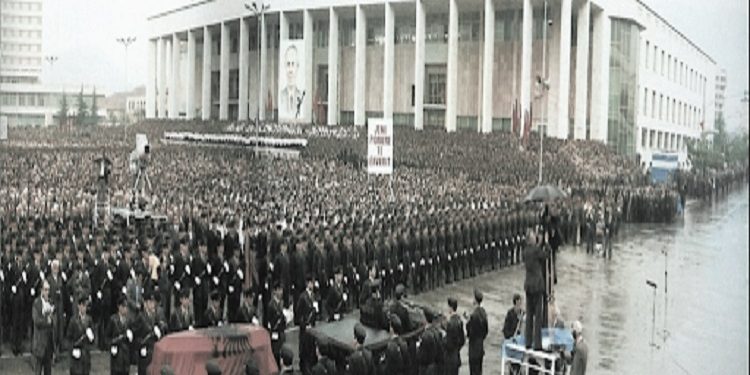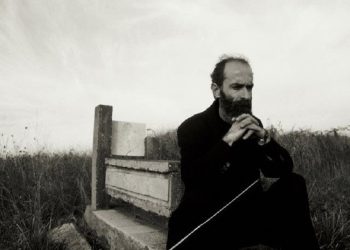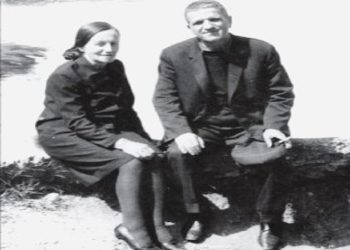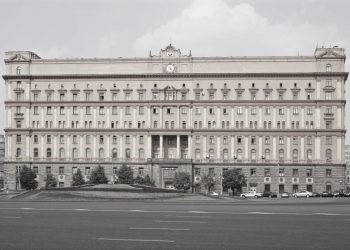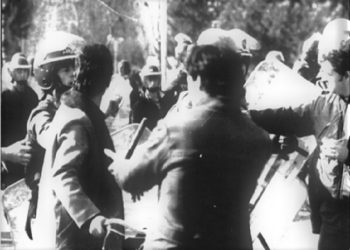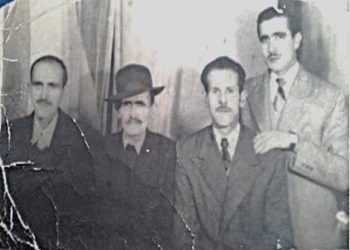By Bashkim Trenova
Part thirty-two
Memorie.al publishes the memoirs of the well-known journalist, publicist, translator, researcher, writer, playwright and diplomat, Bashkim Trenova, who after graduating from the Faculty of History and Philology of the State University of Tirana, in 1966 was appointed a journalist at Radio- Tirana in its Foreign Directorate, where he worked until 1975, when he was appointed as a journalist and head of the foreign editorial office of the newspaper ‘Zeri i Popullit’, a body of the Central Committee of the ALP. In the years 1984-1990, he served as chairman of the Publishing Branch in the General Directorate of State Archives and after the first free elections in Albania, in March 1991, he was appointed to the newspaper ‘Rilindja Demokratike’, initially as deputy / editor-in-chief and then its editor-in-chief, until 1994, when he was appointed to the Ministry of Foreign Affairs with the position of Press Director and spokesperson of that ministry. In 1997, Trenova was appointed Ambassador of Albania to the Kingdom of Belgium and to the Grand Duchy of Luxembourg. Unknown memories of Mr. Trenova, starting from the war period, his childhood, college years, professional career as a journalist and researcher at Radio Tirana, the newspaper ‘People’s Voice’ and the Central State Archive, where he served until the fall of the communist regime of Enver Hoxha, a period of time when he in different circumstances met many of his colleagues, suckers of some of the ‘reactionary families’, etc., whom he described with a rare skill in a book of memoirs published in 2012, entitled ‘Enemies of the people’ and now brings them to the readers of Memorie.al
Continued from the previous issue
“Enemies of the people”
Absurd accusations against me, that I had helped Greece with the bones of St. Cosmas!
I had no knowledge of St. Cosmas and his role or of how it was said that his remains were preserved in the church of Kolkondas. So from Fier we went to Kolkondas. We also went to church. We also saw a small coffin where, as had been orally inherited in several generations by the villagers of the area, the remains of St. Cosmas were found. As I took the initiative I got into a lot of trouble afterwards. According to the Albanian Ministry of Foreign Affairs, I had given the Greeks an argument, a fact which they would use to prove the justice of their claims to southern Albania. To me this kind of reasoning was completely absurd. The Greeks, with or without the bones of Saint Cosmas, had always claimed and would always claim that Southern Albania is part of Greece or the Greek Northern Epirus. To this day, St. Cosmas has been forgotten, but Greece has not given up on its claims. Currently, a Friendship Treaty has been signed between Albania and Greece, while the Law on the War against Albania, adopted in Greece during the Second World War, continues to be in force. Albania and Greece today are two countries that are part of the North Atlantic Alliance, but the Law of War has not been repealed and there is no talk of it being repealed in the future, even indefinitely. Greek diplomats in Albania do not hesitate to publicly name Southern Albania as Northern Epirus, i.e., Northern Epirus.
The story of Kolkondas, however, was closed. Panayotis Christopoulos returned to Athens quite satisfied. I cannot say whether Panajotis Kristopullos had left for Albania, not with a mission of a purely historical-scientific character, but in the service of the megaloides. He was a scientist, but in history there is also known scientists who have served dark purposes. I received him as a scientist and accompanied him thinking that the visit to our country, the contacts with people wherever we went, would have served, at least for an opinion, if not benevolent, at least more realistic towards Albania. On October 9, 1984, Christopoulos sent me a letter in which he wrote, among other things: “My greetings to your family, with the utmost confidence that you have a true friend in Athens.” Was Christopoulos a friend? I never put his friendship to the test, nor did I have the opportunity. I do not even want to prejudge him. However, the troubles with Christopoulos and Kolkondas did not end with his departure either, but would continue further, even for years.
During the trip that we made with Kristopullos through Albania, he noticed that everywhere, in the central squares of the cities, there was a bust of Stalin. He always laughed under his breath and said that Stalin was an executioner, a bloodthirsty, etc. I always opposed it, thus defending the official position of the Albanian Communist Party towards Stalin, that is, that this was one of the great classics of Marxism-Leninism, the leader of building socialism in the Soviet Union and the happiness of the Soviet peoples, a statesman who has played a key role in the overthrow of Nazism and in the liberation of European peoples, etc., in the same vein. I was honest with him, whether or not I was right in what I was saying. On one occasion Panayotis told me that Stalin had killed Trotsky, whom Lenin had had as his closest comrade-in-arms. I told him that Lenin had called Trotsky “the Jew of communism.” I added that I myself had as a project to write a book about Trotsky from this point of view, but that I could not gather the right material. According to Christopoulos, I was the “most fanatical communist” he had ever known.
Sometime after he returned to Athens, Christopoulos sent by mail to the General Directorate of State Archives, two packages filled with books. Among them were two separate books with the note: “For the Union”. One of them was written by Trotsky and the other was dedicated to Trotsky. I took the books and placed them on the small shelf I had in my office. Kristopoulos, surely, had wanted to provide me with material for my project related to the publication of a paper on Trotskyism and Trotskyism. Born and raised in a democratic country, he could not have imagined that the publications by Trotsky or even those that echoed Trotskyism in Albania were treated as extremely dangerous subversive, anti-communist and counter-revolutionary materials!
Letters of denunciation against me and the translator, Efigjeni Shkreli!
Efigjeni Shkreli, who served as a translator during Christopoulos’ stay in Albania, wrote four letters to denounce to the highest party and state authorities my acceptance of these books. A letter was sent to the Minister of Interior, another to the Deputy Prime Minister covering the State Archives as an institution, another to the Secretary of the Central Committee for Ideology and finally to the Secretary of the Party Committee for Tirana. In the letters of Efigen, which had all the same content, except for the arrival of the books, it was also said that I, during the conversations with Christopoulos, during his stay in Albania, had told him that “there is no democracy here”. I would be happy today if I had said that then. Indeed, with Panayotis Christopoulos, I have always reflected the official position, which at the time was also my personal position. Efigenin’s letters, however, would not pass without leaving a trace, without creating stress, boredom, insecurity in me. On the other hand, perhaps these letters, from the way they were treated, made me see more clearly the reality in the country, the “justice” of the communist practice in Albania. Others put a lot of question marks on me. I also put a lot of question marks on them.
One of the secretaries of the Tirana Party Committee, Konstandin Hoxha, called me to a meeting at the headquarters of this Committee. He did not say a word to me in advance why this meeting was requested. I went to the appointed hour. I was accompanied on this occasion by Reshat Alia, who was the secretary of the basic organization of the Party in the State Archive. Even Reshati did not tell me anything why Konstandin Hoxha had asked me. However, I did not feel bad, because I was not even aware of the letters of Epigenes.
In the Committee of the Party of Tirana, Konstandin Hoxha received me coldly and with his first legs, as one could expect someone who had brought serious concerns to the Party! He also did not talk to me about the letters of Ephigen. He asked me about the books that Panayotis Christopoulos had posted to me. According to him, with the fact of sending these books, he was known by the Greek press. According to him, it was always the Greek newspapers that had published articles in which it was written that: “Trotskyist literature is flooding in Albania”, that is, that I had opened the door to the flood of this literature hostile to the ideology of the Labor Party. After this grotesque exposition, he asked me the question: “Why did you need Trotskyist literature?” I repeated to Constantine the same thing I had said to Christopoulos, concerning a wish of mine, to go and publish a book critical of Trotskyist theory and practice. That’s how I told the truth.
He was not interested in that. In front of him was the enemy of the Party and not a communist, not a man, a citizen, who could have been wrong. He continued with another question in the grotesque style, as he had started the meeting. “Why did you want to write this book,” Said Constantine, “that what Comrade Enver wrote about Trotsky and Trotskyism is not enough for you?” Translated, his question meant: “Do not sell us these Profs. You can’t throw it at us. Doesn’t it seem to you that you are smarter, smarter than Comrade Enver, you who want to treat a subject already beaten by him”? Indeed Comrade Enver had written nothing about Trotskyism or about Trotsky. In one speech he accused his opponents, among others, of being Trotskyists just that. Constantine knew this too. I, however, was silent. Otherwise I would fall into the trap of provoking him.
Constantine demanded that the books brought to me by Panayotis Christopoulos be immediately handed over to the District Party Committee. He instructed that the Bureau of the basic organization of the State Archives Party, stand on this case. The party should have punished me. What would be the measure to be taken against me? How far would it go? Constantine did not say this to me or Reshat in my presence. This was said to Reshat in my absence. He forwarded it to the bureau of the organization. At the bureau meeting, I was asked a series of questions that were, without exception, the style of Konstandin Hoxha’s questions.
My answers and explanations were not heard by anyone and no one needed to hear them. Everything was preset. Very aggressive were especially Kristaq Teneqexhiu and Ruhi Sinani. Both reminded me that for things like that or similar, others had ended up in jail. They also reminded me of “hanging” and “rifle bullet”! I knew that these were not words in the wind or thoughts of Kristaq or Ruhi. I knew how the mechanism of class warfare worked even within the Party. Based on the principle of “democratic centralism”, it was the center that guided, instructed and decided how to act on the basis of one case or another. In my case it was, at least, Konstandin Hoxha, secretary of the Tirana Party Committee, the one who had “inspired” the comrades of the organization’s bureau. My dear party was showing me my teeth.
Fortunately, while I was waiting for the Party’s grassroots organization to come together to give me a “democratically” oriented blow, something happened that prevented this. Reshat Alia, the organization’s secretary, had paid a visit to his brother, Ramiz Alia, secretary of the Party’s Central Committee on ideological issues. Ramiz was informed about my case. Apparently, Konstandin Hoxha has asked to prove his piety before the leadership, but also to avoid any responsibility for the measure that would be taken against me. For this he needed the approval of Ramiz Alia.
Ramiz Alia asked his brother, Reshati, how was I, “what does Bashkimi say”? Reshati tells me about my troubles. “The union should make a self-criticism in the organization,” said Ramiz Alia; the organization should decide that he should not be elected in its leadership. The problem to close. “Whoever opens it again will be held accountable to the Party.” “Well, you say so, Reshati told him, but those below you say otherwise”! Ramiz told his brother that he would talk to “those downstairs”. Thus, this problem was temporarily closed to be reopened a few years later by Thoma Murzaku. The organization acted as Ramiz Alia had said. In essence, the decision was not fair even in principle. It violated the status of the Party, according to which every member of the Party had the right to be elected and elected to the governing bodies. As a communist, I was thus deprived of the rights guaranteed to me by the status of the Party, otherwise – the Party Bible. I was already a shady, tainted communist in the biography. However, this avoided the main thing, which from the vocabulary used in the bureau, seemed to be something too heavy for me and my family.
After six or seven years, when the Labor Party was still in power, but in the Albanian Parliament the Democratic Party was already acting as its opposition, I often went to attend its sessions from the hall. Konstandin Hoxha was also part of the parliamentary group of the Labor Party. He constantly attracted my attention with his aggressiveness, with his extreme positions against democratic developments. The clock was left to the dictatorship of the proletariat. I was working at this time in the newspaper of the Democratic Party, “Democratic Renaissance”. One of my first articles in this newspaper was: “I, St. Cosmas and Trotsky.” I simply told my troubles with the dead Trotsky of St. Cosmas and with Constantine Hoxha, a fanatical follower of a dying time.
The accusations against me that I had laughed at the funeral of Enver Hoxha!
Concerns at the State Archives continued to grow throughout the years. Only a few months after the closure of the “Kristopullos” file, I found myself for a while in an even more absurd situation. On April 11, 1985, after 40 years in power, Dictator Enver Hoxha died. On this occasion, to honor and perpetuate his name, the leadership of the Labor Party organized a magnificent rally in the central square of the capital. All schools, all work and production centers, all institutions were ordered to participate in this rally to express their boundless love and respect for Enver Hoxha, to say goodbye to him, as well as to swear that they would remain faithful to him even after death. The employees of the General Directorate of State Archives also participated in this rally. The funeral ceremony would continue after the rally. Enver Hoxha would be escorted to the cemetery of the Martyrs of the Nation. Radio Tirana and Albanian Television would continue to broadcast this part of the ceremony. In the meantime we went back to our offices and from there we watched this broadcast. Some colleagues and I gathered at Thoma Murzak’s office. Other employees gathered near the duty office where a radio was installed. In the end we all gathered as a collective in the meeting room “to share the pain together”, as given by the Party.
When we all gathered, one of the employees of the Archive, Hafsa Krutani, stood up to express her deep sadness and that of the whole collective. She then spoke about my unworthy, almost hostile attitude, at the rally of residents and employees of the capital on the occasion of the death of Enver Hoxha. According to her, I had not joined this deep and nationwide sadness. Always according to her, I had even laughed at the rally! The charge was not easy. It is not that I had not laughed, but this thing had in fact had no direct connection with the dictator’s death or with any pleasure I might have felt for his end. While waiting for a long time for the opening of the rally in the central square of the capital, my friends and I also talked about things that had nothing to do with the death of Enver Hoxha. In these conversations I also laughed.
Hafsaja added a second to the first charge. According to her, the fact that we did not all gather in the meeting room after returning from the rally, but followed the broadcast of the funeral ceremony in groups, was an action that aimed to disrupt the unity of the collective in these extremely difficult moments, which our country and people were passing by. The disruptor was me! It was I who had sabotaged what the Party demanded! If Hafsa’s words thrown irresponsibly had been stood and analyzed “partisanly”, I should have deserved not only exclusion from the Party, but even more. Why not even prison! It was no longer necessary to declare oneself an enemy of the Party and of popular power.
Hafsa was a communist. She had come to the State Archives directly from the ranks of the working class. She thought that it was the eye, the ear and the conscience of the Party in the State Archive, that the Party had sent her to this institution to be on guard and to denounce any deviation, which could be contrary to the line and its orientations. Her words did not resonate. I had to explain how I had practically acted to lead the Party organization and the collective, in this painful test we were going through. I think that in those days when all the official propaganda had as its main purpose to prove how an entire nation was shedding tears for the death of its leader, to admit that there were those who were not in this unison, would not be something wise. Years and years later, the dictator’s widow, Nexhmije Hoxha, will declare: “An entire people cried for Enver Hoxha and no one forced him to shed tears.” This is how this case ended. The worst awaited me in the years that followed, especially after I was elected secretary of the Party’s grassroots organization.
In time I began to get acquainted with the problems of work and with the staff of the Central State Archive. Being the secretary of the basic organization of the Party, whether I liked it or not, I was obliged to listen to anyone who came to my office to raise a problem, to express a dissatisfaction, to complain of an injustice as he could judge or she, etc., etc. The problems in the General Directorate of State Archives extended to the Director-employee relations, more precisely to the relations of the director of this Directorate, Thoma Murzaku, with its employees. In communist Albania, employees who dared to raise a problem were faced with the question: “Does the Party know this? Did you tell the Party? Why have you hidden from the Party so far? Why did you accumulate dissatisfaction and empty them now”?! These etc. similar questions could turn your right against you.
Fierce conflicts with the Director of the Archive, Thoma Murzaku!
The concerns of the employees in the Central State Archive were not few. I did not have the magic key to solve them. The “key” was in the office opposite me, in the office of the director of the General Directorate of State Archives, Thoma Murzaku. I could only talk to him, inform him of the problems and concerns that existed in the institution, propose them and ask him to solve them. Thoma Murzaku, for a long time, socially and not in meetings of the collective or the basic organization of the Party, I have raised a number of problems. They had to do with his defiant and ignorant attitude, not only towards particular employees, the Trade Unions, but also towards the decisions of the Council of Ministers. Feeling like the pet son of the Party, in certain cases, Thomai gave himself the right to ignore any concrete orientation or decision of hers, which did not go well.
Thoma Murzaku did not even want to know about the Trade Unions. We had an irritated conversation together about their role. I have tried to explain to them that their mission is to protect the rights of employees. “What about me”, he said, “as a director, are I not the owner and I do not protect these rights”?! I told him that according to this logic, since the rights of employees are protected by directors, there should be no Trade Unions. In fact, he acted as the owner and considered the Trade Unions to be his property, as well as the employees, as well as the basic organization of the Party itself. Dressed in power, he was part, the gear of the violence exercised by the state power, of his arbitrariness and megalomania. He allowed himself everything illegal, immoral in the broadest sense of the word, because he felt protected by this power. I still had not understood this truth. I thought leaders like him were rusty gears, impairing the normal functioning of the state apparatus. I needed a few more strokes to face the truth.
Looking back now at the years of work in the State Archives, it seems to me that Thoma Murzaku, was “specialized” in creating conflicts with employees. He could not lead otherwise. I, who left the “Voice of the People”, in order not to be part of the conflicts, found myself in the State Archive amidst conflicts, quarrels, I said of endless topics, intrigues and lies. My desire to put an end to them did not match that of Thomas, who found himself among them as a person and as a leader. Thus disagreements with Thomain over the years came to increase. We got to the point where, in almost everything we had opposite positions.
In fact it was his constant clashes with the staff of the State Archives, which were also reflected in our relations. There was no meeting or analysis of work in the collective, where he was not criticized rightly or wrongly. At one point, at a meeting of the Party organization, I showed solidarity with some of the criticism leveled at him by the institution’s employees. He, as always, reacted badly. “You”, said Thoma Murzaku, “now you have come and I do not know things at all”! “You want to come out as a savior,” he told me. At the same time he warned me not to think that since I was the secretary of the basic organization of the Party, they would allow me to do as I pleased! Gradually he started to see me as his enemy and then as an enemy of the Party, of the Albanian state. Memorie.al
Continues the next issue




